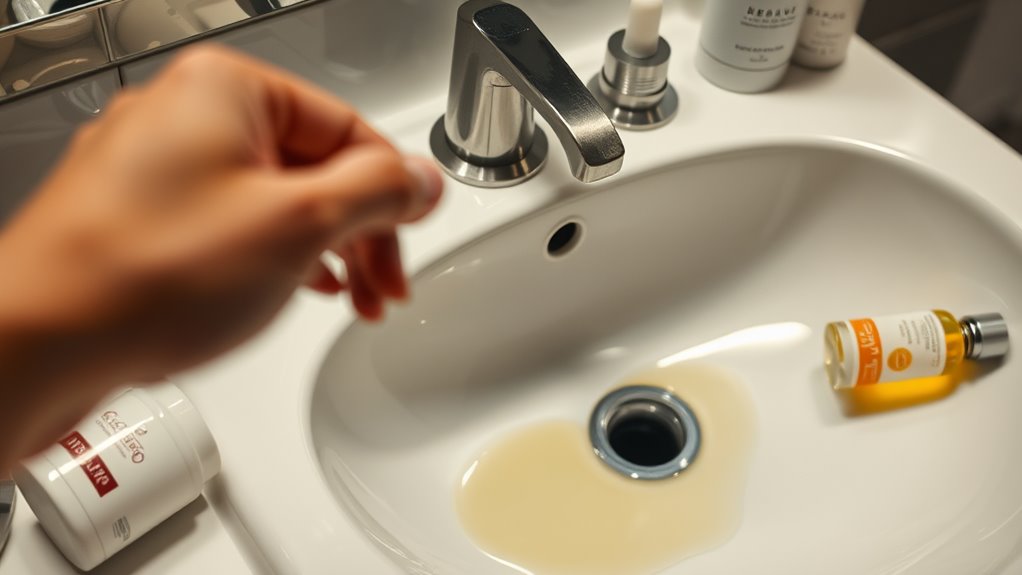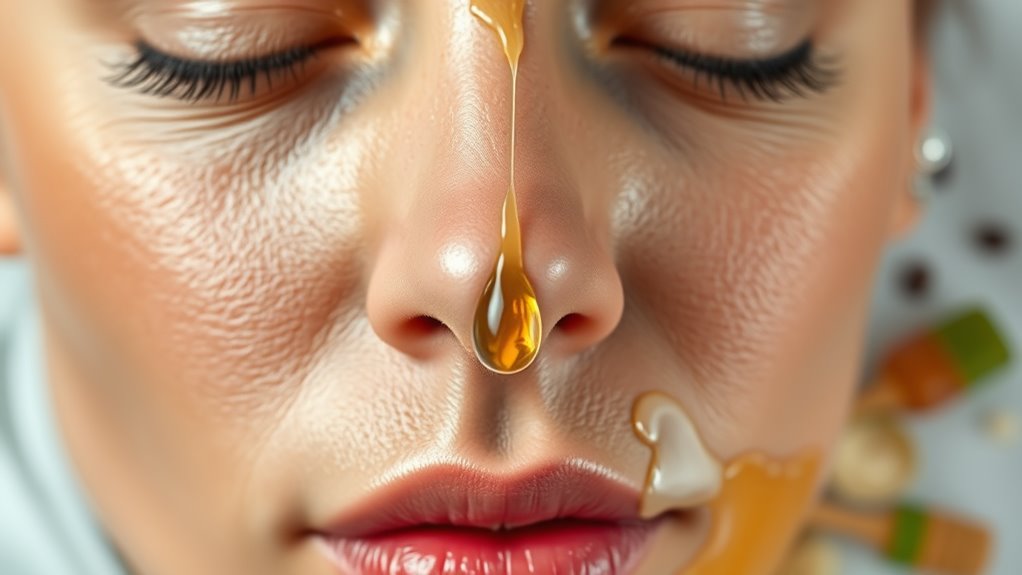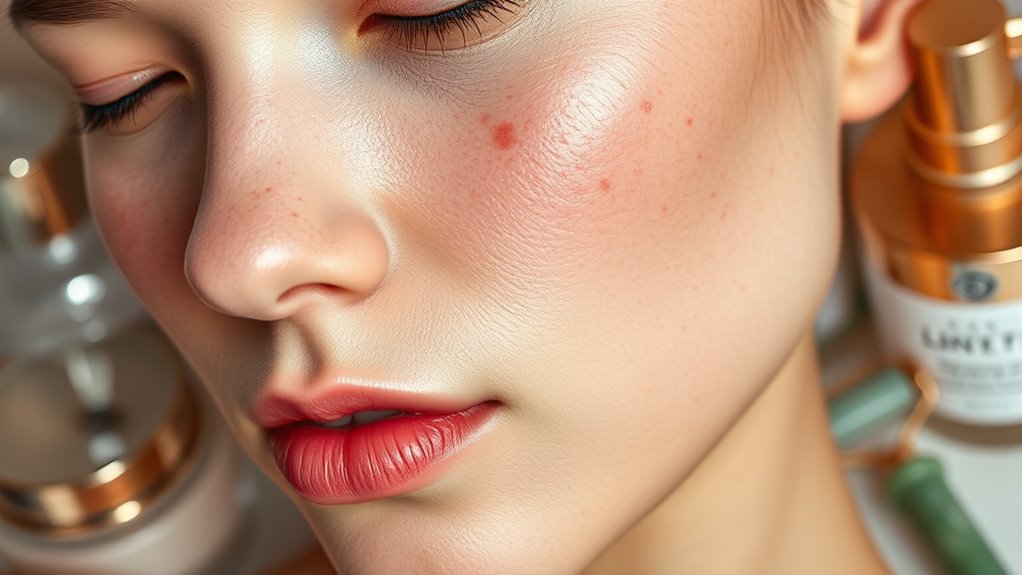This Common Mistake Makes Oily Skin Worse
One common mistake that makes oily skin worse is over-cleansing. Washing your face too frequently strips your skin of essential oils, which can trigger increased sebum production and lead to more oiliness. Instead, stick to a gentle cleanser twice a day to maintain balance. Choose oil-free and non-comedogenic products, as these are kinder to your skin. By making simple adjustments, you can help improve your oily skin’s health. Discover more tips for effective skincare to enhance your routine.
Key Takeaways
- Over-cleansing strips natural oils, leading to irritation and more oil production; limit washing to twice daily with gentle cleansers.
- Using heavy or comedogenic moisturizers can clog pores and worsen oily skin; opt for lightweight, oil-free alternatives instead.
- Alcohol-based products can dehydrate skin, prompting increased oil production; choose hydrating, alcohol-free formulations instead.
- Neglecting sunscreen can result in increased oiliness and skin damage; use a daily oil-free sunscreen to protect and balance skin.
- Over-exfoliation can irritate skin, leading to more oiliness; exfoliate gently 2-3 times a week for best results.
Understanding Oily Skin: Causes and Characteristics
Oily skin is a common concern that many people face, often characterized by excess sebum production and a shiny complexion. Understanding the causes and characteristics of oily skin is essential for effective management. Hormonal fluctuations, genetics, and environmental factors can all contribute to this condition.
You might find yourself making the oily skin mistake of using harsh products, thinking they’ll control oil production. In reality, these can exacerbate the problem by stripping natural oils and triggering even more sebum production. Instead, focus on gentle cleansers and non-comedogenic moisturizers. Incorporating effective solutions can help manage and reduce excess grease throughout the day.
Recognizing these characteristics allows you to tailor your skincare routine, leading to healthier skin. Mastery over your oily skin starts with understanding its unique needs and avoiding common pitfalls.
The Impact of Over-Cleansing
Over-cleansing your skin can strip away its natural oils, leading to an imbalance that prompts your skin to produce even more oil. This cycle not only exacerbates oiliness but can also damage your skin barrier, leaving it vulnerable and irritated. It’s essential to find a balance in your cleansing routine to maintain healthy, resilient skin. Over-cleansing can manifest in various ways, including common signs such as redness and increased sensitivity.
Stripping Natural Oils
When you wash your face too frequently or with harsh products, you risk stripping away the essential natural oils your skin needs. These oils play a crucial role in maintaining your skin’s barrier, offering protection and hydration.
Stripping them away can lead to a compromised skin barrier, resulting in irritation and discomfort. Additionally, over-cleansing can disrupt your skin’s pH balance, making it more susceptible to breakouts and sensitivity.
It’s vital to choose a gentle cleanser and limit washing to twice a day. Incorporating hydrating ingredients, like hyaluronic acid or ceramides, can help replenish moisture.
Increased Oil Production
Stripping your skin of its natural oils can trigger an increase in oil production, a counterproductive response that many don’t expect. When you over-cleanse, your skin senses a loss of moisture and compensates by producing even more oil.
This cycle not only exacerbates your oily skin but can also lead to clogged pores and breakouts. It’s essential to find a cleansing routine that balances oil removal without stripping your skin.
Use gentle, non-comedogenic cleansers that maintain your skin’s moisture levels. Aim to cleanse twice daily, but avoid harsh scrubs and excessive washing.
Skin Barrier Damage
Frequent washing and harsh products can significantly compromise your skin barrier, leading to a myriad of issues.
When you over-cleanse, you disrupt the natural oils that protect your skin, resulting in:
- Increased sensitivity and irritation
- Transdermal water loss, causing dryness
- Heightened oil production as your skin tries to compensate
- Greater susceptibility to breakouts and infections
To maintain a healthy skin barrier, focus on gentle cleansing methods and avoid aggressive exfoliation.
Incorporate hydrating ingredients and moisturizers that strengthen your barrier function.
Remember, a well-balanced skin barrier not only controls oil but also enhances overall skin health.
Mastering this balance is key to achieving the clarity and radiance you desire.
Prioritize your skin’s health by respecting its natural defenses.
Choosing the Wrong Products
Choosing the wrong products can worsen oily skin issues.
Heavy moisturizers and certain ingredients can clog your pores, leading to breakouts.
Instead, opt for non-comedogenic options that provide hydration without the excess oil. Additionally, it’s essential to remember that hydration is key for maintaining healthy skin, even if it feels counterintuitive for those with oily skin.
Heavy Moisturizers and Oily Skin
When it comes to managing oily skin, using heavy moisturizers can be a major misstep that exacerbates the issue rather than alleviating it.
These products often contain thick oils and emollients that can clog pores and lead to breakouts. Instead, focus on lightweight, non-comedogenic alternatives that hydrate without overwhelming your skin.
Consider these key points:
- Opt for gel-based moisturizers**** that absorb quickly and provide hydration.
- Look for oil-free formulas**** designed specifically for oily skin types.
- Incorporate hydrating ingredients like hyaluronic acid for moisture balance.
- Avoid products with heavy silicones that can trap excess oil.
Ingredients to Avoid
Using the wrong ingredients can sabotage your efforts to manage oily skin effectively. First, steer clear of alcohol-based products, as they strip moisture and can trigger more oil production.
Fragrance is another culprit; it may irritate your skin, leading to excess oiliness. Avoid heavy oils like coconut or mineral oil, which can clog pores and exacerbate breakouts.
Additionally, steer clear of silicones, often found in primers, which can create a barrier that traps oil and dirt. Instead, focus on lightweight, oil-free formulations that balance your skin without overwhelming it.
Non-Comedogenic Options Available
How can you ensure your skincare products won’t contribute to breakouts? The key is to choose non-comedogenic options that won’t clog your pores.
Here are some essential products to consider:
-
Lightweight moisturizers: Look for gel-based formulations that hydrate without heaviness.
-
Oil-free sunscreens: Ensure your sun protection is specifically labeled as oil-free and non-comedogenic.
-
Gentle exfoliants: Opt for products with salicylic acid or glycolic acid to help keep pores clear.
-
Mineral makeup: Choose foundations made with zinc oxide or titanium dioxide for a breathable finish.
The Role of Moisturizers in Oily Skin Care
Although many people with oily skin hesitate to use moisturizers, incorporating the right one into your skincare routine is essential for maintaining a healthy balance. The key is to choose lightweight, non-comedogenic formulas that hydrate without clogging pores. It’s important to remember that preventing excess shine is crucial for effective oily skin care.
Here’s a quick comparison of effective moisturizer types for oily skin:
| Moisturizer Type | Benefits |
|---|---|
| Gel-based | Lightweight and oil-free |
| Oil-free lotions | Hydrates without heaviness |
| Hyaluronic acid serums | Attracts moisture to skin |
| Water-based creams | Provides hydration without greasiness |
| Aloe vera gel | Soothes and hydrates |
The Fallacy of Skipping Sunscreen
Why do so many people with oily skin neglect sunscreen in their daily routine? This common misconception can exacerbate your skin issues.
Sunscreen is essential, regardless of skin type, and skipping it can lead to various problems:
-
Increased oil production: Sun exposure can trigger your skin to produce more oil.
-
Breakouts: UV damage can cause inflammation, leading to clogged pores.
-
Premature aging: Without protection, your skin may age faster, developing fine lines and dark spots.
-
Skin cancer risk: Neglecting sunscreen increases your risk of serious skin conditions.
Incorporating sunscreen into your regimen is vital for maintaining healthy, balanced skin, as it serves as your skin’s best defense against harmful UV rays.
Don’t let oily skin deter you from protecting your complexion—prioritize sun protection for optimal results.
Adjusting Your Routine for Better Results
Neglecting sunscreen is just one of many mistakes people with oily skin often make. To achieve better results, you must adjust your skincare routine.
Start by incorporating lightweight, oil-free products that hydrate without clogging your pores. Look for non-comedogenic moisturizers and serums enriched with salicylic acid or niacinamide, which can help control excess oil while providing essential moisture.
Exfoliation is crucial; however, overdoing it can lead to irritation. Aim for gentle exfoliation 2-3 times a week.
Lastly, consider a mattifying primer before applying makeup to create a smooth base.




